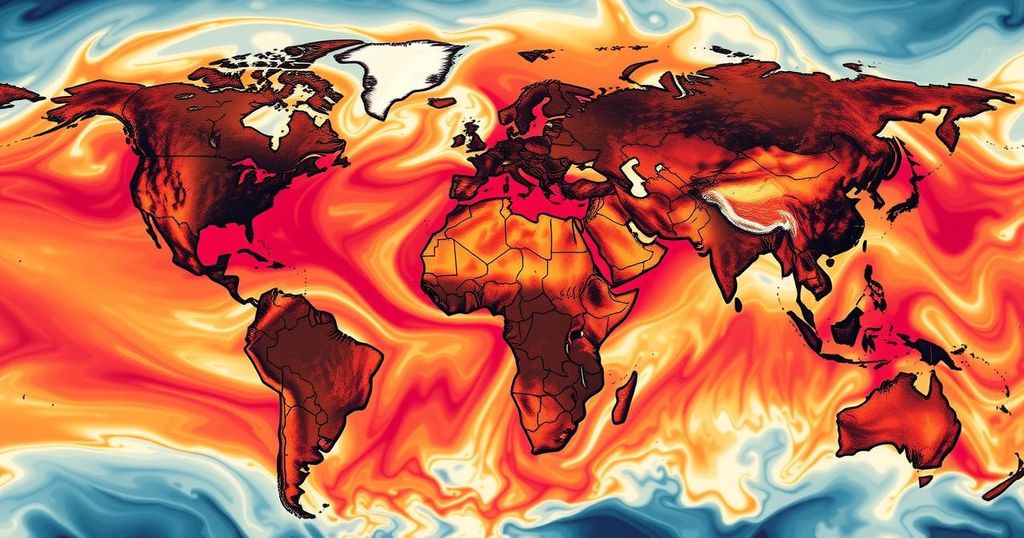Weather
AFRICA, ARCTIC, ASIA, CLIMATE, COPERNICUS, COPERNICUS CLIMATE CHANGE SERVICE, EUROPE, EXTREME WEATHER, FORECAST, GLOBAL WARMING, GREENHOUSE GAS EMISSIONS, NASA, NATIONAL CENTERS FOR ENVIRONMENTAL INFORMATION, NCEI, NOAA, NORTH AMERICA, OCEANIA, SERVICE, SOUTH AMERICA, UK MET OFFICE, WEATHER
Elena Martinez
0 Comments
NOAA Reports 2024 as the Hottest Year on Record Amid Sea Ice Decline
The NOAA’s 2024 climate report declares it the warmest year on record, with temperatures 2.32 degrees Fahrenheit above the 20th-century average and significant declines in Antarctic sea ice coverage. This year also recorded the highest ocean heat content, confirming alarming trends in climate change and emphasizing the need for urgent action.
According to a recent analysis by scientists from the National Oceanic and Atmospheric Administration (NOAA), 2024 has officially been recorded as the warmest year globally, surpassing previous records since comprehensive climate monitoring began in 1850. The average surface temperature of the Earth’s land and ocean was measured at 2.32 degrees Fahrenheit (1.29 degrees Celsius) higher than the 20th-century average, an increase of 0.18 degrees Fahrenheit (0.10 degrees Celsius) compared to 2023, the former warmest year. In addition to remarkably high temperatures, Antarctic sea ice coverage plummeted to its second-lowest extent on record.
The findings of NOAA’s comprehensive climate report reveal that all ten of the hottest years documented since 1850 have occurred within the last decade. Record temperatures are evident regionally as well; Africa, Europe, North America, Oceania, and South America experienced their highest temperatures on record, while Asia and the Arctic recorded their second-warmest years. The global temperature in 2024 exceeded pre-industrial levels by 2.63 degrees Fahrenheit (1.46 degrees Celsius).
Prominent global scientific entities such as NASA, the Copernicus Climate Change Service, and the UK Met Office corroborate NOAA’s findings, confirming 2024 as the warmest year on record based on their independent analyses. Furthermore, Antarctic sea ice extent averaged 4.00 million square miles, marking a significant decline, with February’s minimum extent reaching 830,000 square miles, also the second lowest recorded.
Record heat content was noted in the upper ocean, which, having observed trends since 1958, indicated that the highest ocean heat content to date was reached in 2024. This metric is critical, as the oceans absorb approximately 90% of excess heat from climate change. Global tropical cyclone activity in 2024 was approximately in line with the historical average, with a total of eighty-five named storms reported.
These findings illustrate the ongoing climate crisis, with indicators confirmed by multiple authoritative organizations underscoring the profound changes in Earth’s climate dynamics that have commenced in recent decades. The data presented calls for urgent action to address climate challenges and initiate sustainable practices across the globe.
The NOAA climate report is an essential framework assessing the impact of climate change on global temperatures and natural phenomena such as sea ice extent. Climate scientists utilize data spanning over a century to understand trends and predict future changes, leading to the current findings that indicate unprecedented warming conditions and diminishing polar ice coverage. Understanding these conditions is vital for policymakers and global citizens to implement effective environmental strategies that could mitigate the impacts of climate change going forward.
In conclusion, the 2024 climate report from NOAA underscores alarming trends in global warming, marking it as the hottest year ever recorded. The concurrent decline in Antarctic sea ice coverage highlights environmental consequences resulting from climate change. These findings necessitate immediate and sustained action from governments, organizations, and individuals worldwide to combat the ongoing climate crisis and ensure a sustainable future for the planet.
Original Source: www.noaa.gov




Post Comment